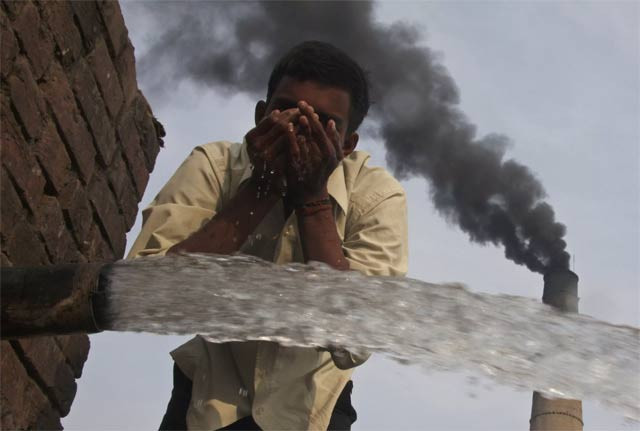Pakistan ill-prepared for CBAM environmental standards
Industry leaders urge govt support to meet EU's 2026 environmental standards.

Pakistan is ill-prepared to meet the stringent environmental standards of the European Union's Carbon Border Adjustment Mechanism (CBAM), raising concerns about potential impacts on the country's export trade and industry.
Pakistan is going to facing significant challenges as the European Union is going to implement the CBAM, which is set to be fully integrated with the EU's Emissions Trading System (ETS) by 2026. It aims to ensure that foreign producers and EU producers face the same carbon costs, preventing "carbon leakage"—a situation where companies shift their production to countries with less stringent regulations.
“Pakistan is ill-prepared for the upcoming Carbon Border Adjustment Mechanism (CBAM) from the EU,” said Ibrahim Shamsi, Director of Zona Pakistan Private Limited and representative of the Karachi Chamber of Commerce and Industry (KCCI) at various climate conferences.
The CBAM requires exporters of iron, steel, aluminum, electricity, fertilizers, cement, and hydrogen to the EU to provide carbon emission disclosures at each stage of the supply chain, beginning October 17, 2023, said executive director of Sustainable Development Policy Institute (SDPI) Dr Abid Qaiyum Suleri.
Although only 1.23% of Pakistan’s exports are currently at risk under CBAM, the potential inclusion of textiles—critical to Pakistan’s export economy—demands preemptive strategic policy measures to maintain market competitiveness in Europe.
The influence of the CBAM extends beyond the EU, prompting a global movement toward carbon pricing, he said. Countries like Indonesia, Japan, and Vietnam are establishing their own carbon markets, while the U.S. increasingly requires companies to disclose their carbon emissions.
For Pakistani exporters, this shift necessitates reducing emissions or incurring offset costs, making it vital to establish tailored industry-specific Monitoring, Reporting, and Verification (MRV) protocols, he added.
"Complexities arise in measuring, reporting, and certifying emission reductions," said Suleri. New certification standards include the Gold Standard, Verified Carbon Standard (VCS), and others, which require compliance with the ISO 14065:2020 standard for validating and verifying greenhouse gas emissions reductions. Without ISO-certified verification bodies, compliance costs and timelines will significantly increase for Pakistan.
In response to the CBAM, the establishment of a National Carbon Pricing Policy and a carbon tax that mirrors EU emission fees emerge as strategic necessities, he emphasized. Energy reforms could significantly reduce emissions, enabling industries to source cleaner electricity and reduce reliance on fossil fuels. Transformative approaches in agriculture, such as alternate wetting and drying in rice cultivation, can also align with international best practices and meet methane reduction pledges.
Interestingly, Ibrahim Shamsi views CBAM as an opportunity rather than an obstacle. “This presents a chance to rethink our business practices and leverage new technologies, allowing us to make significant strides in areas where we have fallen behind,” he explained. He referred to the CBAM as a “reset button” for Pakistani industries.
Currently, businesses are grappling with the highest utility rates in the region. Industries even must purchase water in Karachi that costs potentially halving their operational budgets. “We are already aware of our carbon footprint and are using these utilities judiciously,” Shamsi said.
The implementation of new technologies could facilitate a transition to greener practices and reduce liabilities by lowering costs. However, he pointed out that high-interest rates pose a significant deterrent to importing green technology and machinery.
Public awareness initiatives are essential for educating the industry and the broader public about the implications of the CBAM and the benefits of low-carbon operations, Dr Abid Qaiyum Suleri added. A comprehensive monitoring and evaluation framework will enhance transparency and accountability, facilitating a credible transition to a low-carbon economy.
An official at the Ministry of Commerce, speaking on condition of anonymity, shared insights into the ongoing efforts to address the European Union’s Carbon Border Adjustment Mechanism (CBAM).
The official stated, “This is a work in progress. The Ministry of Climate Change (MoCC) is actively working on developing strategies to comply with CBAM requirements. We are currently engaged in technical consultations to ensure our approach is comprehensive and effective. The Ministry of Commerce (MoC) is providing critical input during these discussions.”
The official further elaborated on the initiatives being undertaken, saying, “We have organized several awareness sessions to educate stakeholders about CBAM and its implications. These sessions aim to equip businesses with the knowledge and tools needed to adapt to the new regulations. Additionally, we have a few more sessions and initiatives in the pipeline to further support our industries in this transition.”
Effective interministerial coordination and a shared vision between the federal government and regional units are vital. Creating local and regional carbon markets could encourage companies to reduce emissions, promoting compliance with CBAM requirements while generating foreign exchange through the sale of carbon credits.
Shamsi emphasized the need for government support, suggesting measures such as allowing zero-interest loans for machinery purchases and reducing customs duties.
“The government should have been considering these steps ten years ago though,” he said. The Ministry of Commerce and policymakers should have anticipated this situation a decade ago, but they often react too late. As discussions continue between the federal government and regional units, integrating climate considerations into national trade policies is crucial," said Suleri.
By proactively engaging with the CBAM and reducing carbon emissions, Pakistan can ensure its industries remain competitive, sustainable, and compliant with international environmental standards. A whole-of-government approach is necessary to seize opportunities and tackle the challenges posed by climate change.


















COMMENTS
Comments are moderated and generally will be posted if they are on-topic and not abusive.
For more information, please see our Comments FAQ